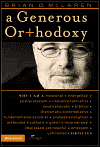
Again, Doug Wilson on Brian McLaren:
"it is clear that McLaren has a hearing, and many people in evangelical circles are paying attention to him. But because his liberalism and unbelief are so transparent, the fact that otherwise intelligent people are being taken in by him shows that this is a spiritual matter, and not a question of IQ. In the Bible, folly is a moral category, not an intelligence category. This means that anyone who thinks McLaren is "just great" needs to.... just repent. Tell God you're sorry. Humble yourself. Stop staring at the pig food. Just go home.
"[McLaren says:] 'Jesus didn't want to create an in-group which would banish others to an out-group; Jesus wanted to create a come-on in group, one that sought and welcomed everyone' (p. 247). [Wilson:] This is why Jesus talked so much about people being bound hand and foot, and thrown into the 'come-on-in darkness.' Where the worm is friendly, and the fire cozy."
Hi Steve,
ReplyDeleteI confess I haven't read "Generous Orthodoxy", but I have read some of McLaren's other stuff. While I don't agree with him on every point, I do respect the fact that he is trying to reach a group of people who the traditional church has not been too effective at reaching.
I confess I am sometimes discouraged when I encounter the attitude that anytime we "try to reach" someone by meeting them where they are at, we are watering down the gospel. While I agree that Jesus spoke of being "thrown into the darkness" I don't think it is fair to characterize this as something "Jesus talked so much about...". Jesus also invited the weary to come to him for rest... was he "watering down the gospel" when he did this?
I may not go as far as McLaren in attempts to reach others, but I think it is time we reflect on the possibility that we haven't gone far enough out of fear of watering down the gospel.
Agreed, again.
ReplyDeleteThanks for the good post Steve. Tim, what Maclaren does is not merely watering down the gospel, but syncretism of the worst sort so that the gospel is not the gospel at all.
ReplyDeleteHas anyone here read the book in its entirity, or are you all basing this on Wilson's critique?
ReplyDeleteI hate to do it, but I may have to read the book now just to find out what he really is trying to say!
Yes, I have read the book (and some others from McLaren). I think the biggest issue I have is the subtlty with which McLaren writes. On the one hand he seems to affirm everything, and on the other he seems to affirm nothing. At some point the Gospel of Jesus Christ must say yes to someting and no to something else. McLaren's geneorur orthodocy is too generous to be orthodox...even though all he rhetoric is there and it sounds oh so good (perhpas like the forbidden fruit in Eden??).
ReplyDelete"I don't think one needs to read the book in its entirety in order to criticize a small part of it."
ReplyDeleteThe problem is that it is the entirety of the book that helps us understand what the "small part" is really trying to say.
For example:
Romans 5:18 (NIV)
"Consequently, just as the result of one trespass was condemnation for all men, so also the result of one act of righteousness was justification that brings life for ALL men." (emphasis mine)
Taken out of context, I would say that Paul is on McLaren's side of this issue.
Steve, you ask: "I'm interested in why you assume his review DOES take McLaren out of context."
ReplyDeleteWhen it comes to matters of faith, I'm one of those people who, like Thomas, come to believe more readily through experience than through words. (I know... very un-reformed of me!)
Also, I have heard & read enough of McLaren and others like him to hope that their fumbling attempts at articulating their emmerging faith might yet provide us with an innoculation against the Pharisaism that Jesus rails against in Matthew 23 and the liberalism that leads only to a dead God and a meaningless faith.
I just started the book... I'll let you know what I find!
Mclaren on McLaren...
ReplyDeleteMcLaren, p. 39 -- "The people I'm primarily writing for are the Christians (or former Christians) -- evangelical, liberal, Catholic, whatever -- who are about to leave (or have just left) the whole business becasue of the kinds of issues I raise in this book. And equally, I'm writing for the spiritual seekers who are attracted to Jesus, but they don't feel there's room for them in what is commonly called Christianity unless they swallow a lot of additional stuff. Not essential orthodoxy, [which, by the way, Mclaren seems to indicate as being the tenets of the Apostle's and Nicene Creeds], but rather doctrinal distinctives -- the fine print added to the contract of orthodoxy -- that are fine to explore and discuss but threaten to become far more important than the gospel warrants."
For some reason that paragraph made me wonder what it would look like if we tried to develop a theological orthodoxy based on the experience of the theif on the cross. One day, he's a criminal. The next, he's in paradise. What did he believe or not believe that brought about such a change? Is it possible that Christianity could be reduced to the theology of the thief on the cross and still be orthodox?